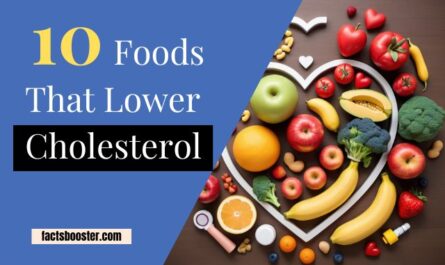Cholesterol’s role in health can’t be overstated, influencing everything from heart disease to strokes. High levels pose risks, yet understanding how to navigate these can safeguard cardiovascular health. You’ll discover strategies for dietary changes, increased exercise, and weight management to not only lower cholesterol but also boost overall wellness.
Key Takeaways:
- Implement heart-healthy dietary habits to manage cholesterol effectively.
- Incorporate regular physical activity into your routine for cardiovascular benefits.
- Adopt lifestyle changes such as smoking cessation and moderate alcohol consumption to complement these efforts.
Understand About Cholesterol
Cholesterol, a waxy substance found in your blood, is essential for building healthy cells. However, high levels of it can jeopardize your cardiovascular health, increasing the risk of heart disease.
There are two main types: ‘good’ HDL cholesterol, which supports heart health by removing other forms of cholesterol from your bloodstream, and ‘bad’ LDL cholesterol, which can build up in artery walls, leading to blockages. (1)
Balancing these levels is critical for maintaining heart health and preventing heart disease.

How To Lower Cholesterol
You stand on the threshold of making impactful lifestyle changes that could significantly lower your cholesterol levels and bolster your cardiovascular health. This guide will walk you through practical measures aimed at enhancing your diet, encouraging exercise, managing weight, and adopting healthier general habits.
Given the rising concerns over high cholesterol foods and their effects on heart disease, it’s crucial to prioritize these changes. They are not merely recommendations but vital steps towards a healthier heart and a longer life.
1. Eat Healthy Foods
Incorporating heart-healthy foods into your diet stands as a critical step toward lowering cholesterol and boosting cardiovascular health. You should focus on foods rich in dietary fiber and those low in high cholesterol content.
Emphasize consuming a variety of fruits, vegetables, whole grains, and lean proteins. These dietary choices not only aid in managing weight but also play a pivotal role in heart disease prevention. Transitioning to these healthier dietary habits can significantly influence your overall well-being.
2. Exercise More
Engaging in regular physical activity proved beneficial for your cardiovascular health. It significantly assists in reducing high cholesterol levels. Doctors often recommend that you aim for moderate exercise, like brisk walking or cycling, most days of the week.
Ideally, this should total at least 150 minutes per week. Committing to this routine encourages a healthy heart and fosters efficient weight management, crucial in lowering cholesterol and preventing heart disease.
Read more:
3. Lose Weight
Managing weight proved crucial for lowering cholesterol and bolstering cardiovascular health. Shedding extra pounds will impact cholesterol levels significantly, making heart disease prevention more attainable.
Focus on a balanced diet rich in dietary fiber and low in high cholesterol foods for effective weight management. Incorporating regular exercise enhances your ability to manage weight efficiently, further improving cardiovascular health.
By adhering to these guidelines, attaining and maintaining a healthy weight becomes a tangible goal, marking a positive step towards better health.
4. Stop Smoking
Quitting smoking will have an immediate effect on your cardiovascular health. Once you decide to stop, you’ll notice a significant improvement in your cholesterol levels.
Quitting smoking aids in increasing ‘good’ HDL cholesterol, which plays a crucial role in removing ‘bad’ LDL cholesterol from your arteries. You will not only help your heart but also enhance your overall health. (2)
For support, seek guidance from health professionals, join quit-smoking programs, or look into nicotine replacement therapies. These steps can guide you toward a smoke-free life, improving your heart health and cholesterol levels.
5. Drink Alcohol Moderately
Drinking alcohol in moderation has been linked to a modest improvement in cardiovascular health and cholesterol management. Moderation typically equates to one drink per day for women and up to two for men.
This approach can influence the balance of high-density lipoprotein (HDL), known as the “good” cholesterol, potentially increasing its levels.
However, it’s crucial to understand that exceeding these guidelines may reverse benefits, leading to health issues, including a rise in high cholesterol foods’ negative effects. Moderation remains key.
Healthy Dietary Habits
Adjusting your dietary habits plays a critical role in managing cholesterol levels. Focus on monounsaturated fats, which have been known to lower ‘bad’ LDL cholesterol, fostering improved cardiovascular health.
Avocadoes and olive oil are prime sources. Prioritize polyunsaturated fats, especially omega-3 fatty acids, to support heart health, with flaxseeds and fish as excellent choices. Limit trans fats, notorious for escalating heart disease risk, by avoiding processed foods.
Finally, eat soluble fiber found in oats and beans, as it helps to reduce cholesterol absorption into your bloodstream.
1. Focus On Monounsaturated Fats
Monounsaturated fats play a pivotal role in improving cardiovascular health. They have shown potential in lowering levels of ‘bad’ LDL cholesterol, a known risk factor for heart disease. (3)
Consuming these fats instead of their saturated counterparts will not only enhance your cholesterol profile but also contribute positively to weight management. Foods rich in monounsaturated fats include avocados, almonds, and olive oil.
Integrating these into your daily diet can pave the way for a healthier heart and a balanced lifestyle.
2. Prioritize Polyunsaturated Fats, Especially Omega-3
You have heard that not all fats are enemies to your cardiovascular health. Indeed, polyunsaturated fats play a pivotal role in maintaining heart wellness, especially omega-3 fatty acids.
Unlike their saturated counterparts that contribute to high cholesterol, polyunsaturated fats, including omega-3s, can help lower levels of ‘bad’ LDL cholesterol while promoting a healthy heart. Sources rich in these essential nutrients include fish like salmon and mackerel, as well as flaxseeds, walnuts, and canola oil.
Making these foods a regular part of your diet could prove beneficial in your quest to enhance cardiovascular health and manage cholesterol effectively.
3. Limit Trans Fats
Impactful steps exist to tackle high cholesterol, crucial among them is slashing trans fats from your diet. These fats have been linked directly to an uptick in bad LDL cholesterol, laying down a red carpet for heart disease to enter your life.
Commonly found in processed foods, baked goods, and fried items, trans fats lurk in the shadows of many favorite meals. By identifying and avoiding these hidden enemies, you pave the way for better cardiovascular health and a significant reduction in heart disease risk.
It’s a simple yet profound change towards safeguarding your heart’s wellbeing.
4. Eat Soluble Fiber
Incorporating soluble fiber into your diet will have played a significant role in lowering your cholesterol levels. This type of fiber binds with cholesterol in the digestive system, directing it out of your body before it can circulate in your blood.
Choices for high-fiber foods include oats, beans, lentils, apples, and pears. Consuming these can make a notable difference in managing cardiovascular health. Understandably, focusing on dietary habits, especially increasing your intake of dietary fiber, emerges as a key strategy in the fight against high cholesterol.
Actively adjusting your dietary habits to include these foods won’t just aid in heart disease prevention; it will enrich your overall wellness.
What Supplements Can Help
Research indicates that certain supplements may support efforts to manage cholesterol levels effectively. Fiber supplements, such as psyllium, have been shown to lower ‘bad’ LDL cholesterol. Incorporating omega-3 fatty acid supplements, found in fish oil, can contribute to cardiovascular health.
Plant sterols and stanols help block the body’s absorption of cholesterol. However, it’s imperative to approach supplementation with caution. Always discuss with a healthcare provider before starting new supplements.
They can assess for potential interactions with medications or underlying health conditions. This step ensures that your journey towards better cardiovascular health through cholesterol management is both safe and beneficial.
Conclusion
Managing cholesterol levels is crucial for preventing heart disease and ensuring cardiovascular health. By embracing healthy dietary habits, increasing exercise, and making informed lifestyle changes, you’ve taken significant steps towards a healthier future. Remember, every choice you make can lead to a stronger heart and a longer life.


